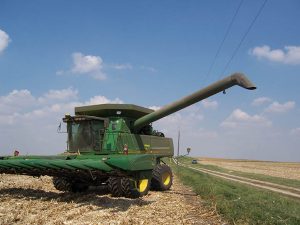
It can be an exciting and exhausting time, the culmination of a season of hard work. However, the rush to harvest can also yield tragic outcomes. Each year, dozens of farm workers are killed, and hundreds are injured in accidents involving power lines and electrical equipment.
“Things people see every day can fade from view, and in the busyness of harvest time, it’s easy for farm workers to forget about the power lines overhead,” said Richard McCracken of the Safe Electricity Advisory Board. “But failure to notice them can be a deadly oversight.”
Review the farm activities that take place around power lines with all workers. Inspect the height of farm equipment to determine clearance. Keep equipment at least 10 feet away from power lines — above, below and to the side — a 360-degree rule.
“Always lower grain augers before moving them, even if it’s only a few feet,” said Bob Aherin, PhD, CSP and University of Illinois Professor and Agricultural Safety and Health Program Leader. “Variables like wind, uneven ground, shifting weight or other conditions can combine to create an unexpected result. Also, use extreme caution when raising the bed of a grain truck.”
Farm workers should take these steps to ensure a safer harvest season:
- Use care when raising augers or the bed of grain trucks around power lines.
- Use a spotter when operating large machinery near power lines. Do not let the spotter touch the machinery while it is being moved anywhere near power lines.
- As with any outdoor work, be careful not to raise any equipment such as ladders, poles or rods into power lines. Remember, non-metallic materials such as lumber, tree limbs, ropes and hay will conduct electricity depending on dampness, dust and dirt contamination.
- Never attempt to raise or move a power line to clear a path!
- Don’t use metal poles to break up bridged grain inside bins. Know where and how to shut off the power in an emergency.
- Use qualified electricians for work on drying equipment and other farm electrical systems.
- Operators of farm equipment or vehicles must also know what to do if the vehicle comes in contact with a power line. Stay on the equipment, warn others to stay away and call 911. Do not get off the equipment until the utility crew says it is safe to do so.
“If the power line is energized and you step outside, touching the vehicle and ground, your body becomes the path and electrocution is the result,” Aherin said. “Even if a power line has landed on the ground, the potential for the area nearby to be energized still exists. Stay inside the vehicle unless there’s fire or imminent risk of fire.”
If this is the case, jump off the equipment with your feet together, without touching the ground and vehicle at the same time. Then, still keeping your feet together, hop to safety as you leave the area.
Once you get away from the equipment, never attempt to get back on or even touch the equipment. Some electrocutions have occurred after the operator dismounts and, realizing nothing has happened, tries to get back on the equipment.
It is very important that all farm workers and seasonal employees are informed of electrical hazards and trained in proper procedures to avoid injury.



